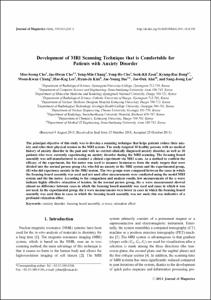KUMEL Repository
1. Journal Papers (연구논문)
1. School of Medicine (의과대학)
Dept. of Nuclear Medicine (핵의학)
Development of MRI Scanning Technique that is Comfortable for Patients with Anxiety Disorder
- Keimyung Author(s)
- Zeon, Seok Kil
- Department
- Dept. of Nuclear Medicine (핵의학)
- Journal Title
- Journal of Magnetics
- Issued Date
- 2011
- Volume
- 16
- Issue
- 4
- Abstract
- The principal objective of this study was to develop a scanning technique that helps patients reduce their anxiety and relax their physical tension in the MRI system. The study targeted 10 healthy persons with no medical history of anxiety disorder in the past and with no current clinically diagnosed anxiety disorder, as well as 10 patients who were currently experiencing an anxiety disorder during the MRI scanning. The focusing board assembly was self-manufactured to conduct a clinical experiment via MRI scans. As a method to confirm the efficacy of the experiment, the bio meter was used to measure brainwaves from the study targets that were divided into the normal person group (A), who felt no anxiety in the MRI system and the experimental group, (B) who did experience anxiety in the MRI system. The two groups were compared between the cases in which the focusing board assembly was used and not used after measurements were conducted using the model MRI system and the bio meter. According to the comparison and analysis results, low measurements of the wave indicate highly effective relaxation of tension. In the normal person group, the wave measurement showed almost no difference between cases in which the focusing board assembly was used and cases in which it was not used. In the experimental group, the wave measurements were lower in cases in which the focusing board assembly was used than in cases in which the focusing board assembly was not used; this was indicative of a profound relaxation effect.
- Keimyung Author(s)(Kor)
- 전석길
- Publisher
- School of Medicine
- Citation
- Moo-Seong Cho et al. (2011). Development of MRI Scanning Technique that is Comfortable for Patients with Anxiety Disorder. Journal of Magnetics, 16(4), 350–362. doi: 10.4283/JMAG.2011.16.4.350
- Type
- Article
- ISSN
- 1226-1750
- Appears in Collections:
- 1. School of Medicine (의과대학) > Dept. of Nuclear Medicine (핵의학)
- 파일 목록
-
-
Download
 oak-aaa-3013.pdf
기타 데이터 / 582.06 kB / Adobe PDF
oak-aaa-3013.pdf
기타 데이터 / 582.06 kB / Adobe PDF
-
Items in Repository are protected by copyright, with all rights reserved, unless otherwise indicated.